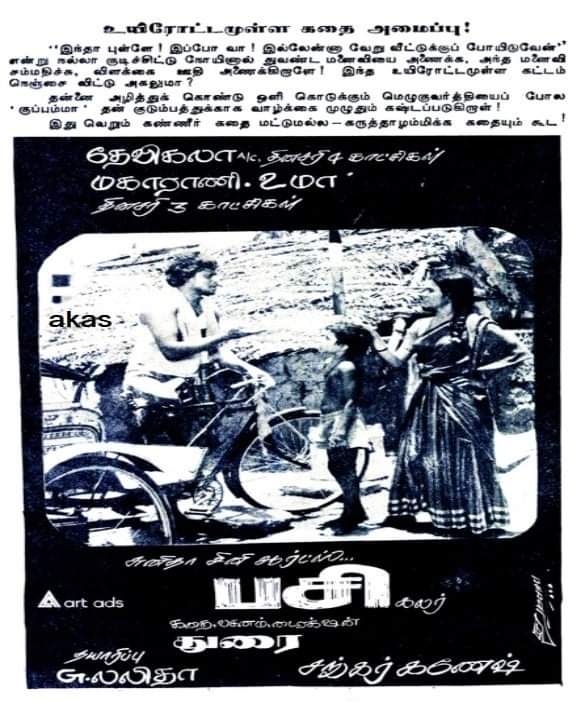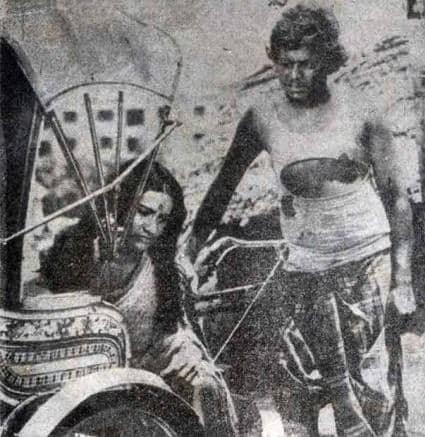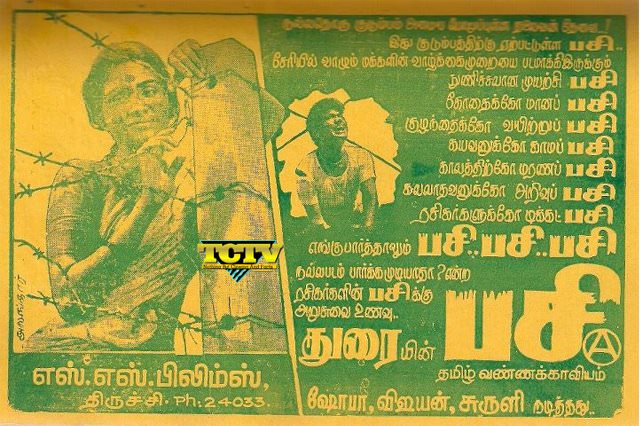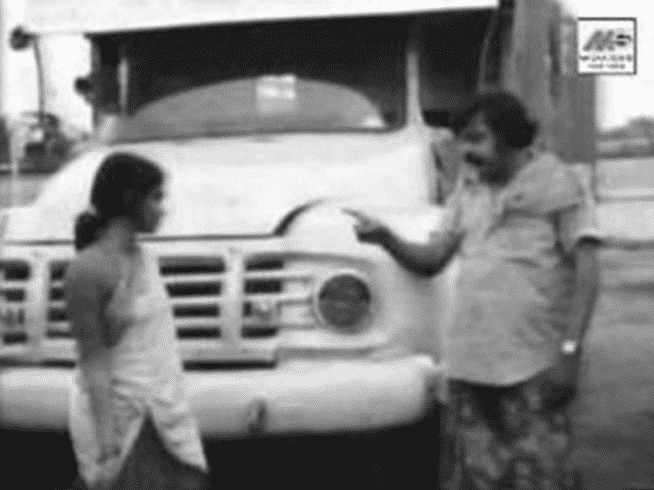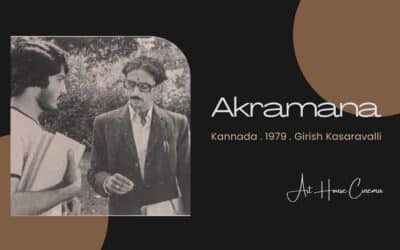Pasi (Eng: Hunger) is a 1979 Tamil film directed by Durai and has Shoba, Delhi Ganeshan, and Vijayan in prominent roles. The film is notable for its realistic portrayal of life in the most deprived stratum of society, in all its dignity. Pasi was critically acclaimed and won many National and State film awards.
Cast
- Sobha – Kuppamma
- Vijayan – Rangan
- Delhi Ganesan – Manian
- Praveena Bhagyaraj – Kumudha
- T Lalitha – Valliamma
- Sathya – Chellamma
- Senthil – Arumugam
Crew
- Direction – Durai
- Story – Durai
- Music – Shankar Ganesh
- Cinematography – V. Ranga
- Editing – M. Vellaichamy
- Production – C.K.Shanmugam Lalitha, G. Durai
Story
The movie focuses on the family of Muniyandi, a cycle rickshaw puller who resides in a slum and makes his living out of a leased cycle rickshaw. His family includes his wife, daughter Kuppamma, sons, and a younger daughter who is differentially abled. Mostly every day, he returns home inebriated after spending most of his earnings on liquor. Kuppamma’s meager income from rag-picking is their lifesaver. Her friend Chellamma is also her fellow rag-picker. Kuppamma gets acquainted with a lorry driver through Chellamma. He bought her food whenever they happened to meet. One day he buys her enough biryani for herself and her family. Having gained her trust, he seduces Kuppamma. When Kuppamma’s mother hears of her daughter’s tryst with the lorry driver, she ends her life on the nearby railroad tracks. Meanwhile, Kuppamma learns that the lorry driver is a married man and so ends all contact with him. Kuppamma’s neighbors in the slum gang up against the lorry driver, but she rescues him by denying any involvement with him. The man is tormented by intense remorse. Despite being a family man, he had taken advantage of a young woman and the very woman had saved him from an impending mob attack.
Muniyandi has great respect for a young lady who regularly travels in his rickshaw. He is unaware that she is being forced into prostitution by her mother. When Kuppamma meets the woman, she seeks her help to get a better job. The woman reveals her real plight to Kuppamma, but promises to help Kuppamma in some way. Later on, Kuppamma comes to know that she is pregnant. Poverty-stricken and ailing from the advancing pregnancy, her days are spent in utter misery. Heavily pregnant, she collapses on the street while trying to make it to the hospital all alone. By the time the lorry driver and his empathetic wife turn up for her rescue, Kuppamma is no more. She passes away on the street during childbirth. Her newborn is taken in by the lorry driver’s wife.
Author’s Notes
Food, clothing, and shelter form the basic needs of a human being. A major fraction of the world population is far from being self-sufficient in meeting their basic needs. The same is the case in India. The rapid urbanization and rural to urban migration for better livelihood opportunities have drastically escalated the severity of this situation. Along with India’s metropolitan cities Mumbai, Delhi, Kolkata, and Chennai, the smaller cities are also saturated with slums. Temporary settlements have mushroomed over sewage canals, under flyovers, and in wastelands. The life of the millions of homeless who thrive in slums and footpaths have been the inspiration and theme of many a movie. Pasi, directed by Durai is one among them. Pasi is an exposé of the lives of the impoverished in the slums of Chennai (then known as Madras).
Slums are the hotbeds of poverty, epidemics, and health hazards. In Chennai, slum dwellers living in makeshift shelters with flimsy tin sheets, plastic sheets, or thatched roofing form a significant share of the city population. Tamil cinema has often featured them as lowlife. Pasi does not take after the same path of characterizing them as murderers, muggers, or rapists. It is the first Tamil movie that attempted a candid depiction of the life of the poor in all its actuality.
Pasi is not the typical Tamil movie. A stark contrast from the usual scenes of flamboyance and luxury, Pasi presented the audience with actual visuals of life. Developed on the fundamentals of neorealism, the movie sketches the poverty and despair of life in the slums in all its genuinity. The cinematography style of Pasi is devoid of artificiality and takes the viewer along through the rugged life in the streets.
The movie focuses on Kuppamma’s life as the main thread. Through her contacts and acquaintances, the director also throws light on lives in the neighborhood. Rakkamma, the idli vendor is a prominent character who actively involves in any issue in the neighborhood. She is Kuppamma’s only refuge after her mother’s demise. An authoritarian with a sharp tongue, Rakkamma has a way with people that impart liveliness to many scenes.
The young woman who regularly travels in Muniyandi’s rickshaw is not a slum dweller. But, her plight is even worse. She is highly against prostitution and is being forced into it by her own mother. The director portrays the woman who undermines her daughter’s honor for a living as an absolute contrast to Kuppamma’s mother who could not live on once Kuppamma compromised her virtue.
The local shopkeeper who leases cycles & mike sets presents a caricature that offers comic relief. He tries to attract Kuppamma by playing loud songs and shouting “Mike testing…” through his loudspeakers. When he goes over the top with his antics, she glowers at him and he backs down immediately.
Pasi is not about the extensive introspection of lives in the shanty towns. The camera focuses entirely on the life of Kuppamma. The movie progresses only through the lives of people and incidents connected with Kuppamma. For the same reason, Pasi does not give the feel of a documentary whereas it is a common occurrence among similar movies. The emotional instances all along the movie have been picturized convincingly without a trace of exaggeration.
The lorry driver has a unique character profile. He cannot be deemed as a mere womanizer. The attraction he felt for Kuppamma is genuine. Yet, he cunningly uses her poverty and hunger to his benefit. He helps to release her father from prison. On the spur of a moment, she lets him take advantage of her. He seduces her after he fed her biryani to satisfy her hunger and also bought enough for her family. It seems as if the hunger of a lifetime surfaces before her. He falsely promises to look after her for life and hides the fact that he is a married man with children. Kuppamma implicitly trusts her friend Chellamma’s words that he is a good man and so, is besotted with him.
After seducing Kuppamma, he does not disappear from the scene as the character would normally be expected to do. Guilt tortures his conscience. He tries to get in touch with her and make amends. Kuppamma rescues him by vouching for his innocence when the slum dwellers are about to beat him up. This incident increases his guilt manifold. Yet, being a family man, he is powerless. Memories of Kuppamma keep on haunting him. Later on, with the consent of his considerate wife, he sets on to bring home pregnant Kuppamma.
Pasi unravels the cross-section of a slum by direct and undeviating depiction. Through poignant scenes, Durai effectively pricks the conscience of the apparently sophisticated audience. The cinematography and editing techniques of the movie gel well with its ambiance. Wherever lives come to a standstill, still frames have been used. The presence of an excess of objects in the foreground in medium shots using a wide-angle lens conveys well that the lives portrayed are far away from the mainstream of society.
Pasi makes the viewer oblivious of the fact that there are actors in the movie. Shobha’s portrayal of Kuppamma is considered rare and exceptional in Indian cinema. In the movie, only Kuppamma exists and not Shobha. The effective transformation of Shobha into Kuppamma alludes to her immense talent as an actress. Delhi Ganeshan’s Muniyandi, Vijayan’s lorry driver, and Jayabharathi as his wife excelled in their individual roles. The film served as a launchpad for Delhi Ganesh, Senthil, and Pasi Sathya who went on to be popular in mainstream Tamil cinema.
The absence of songs and dance sequences in Pasi accentuates the gravity and realism of the theme. The background music is subtle, yet sets the emotional tone in scenes perfectly. Tamil cinema is synonymous with grand big budget entertainer movies. In this context, it is a rare accomplishment that Pasi made its mark by telling the story of the underprivileged living in streets and slums.
For her acclaimed performance in Pasi, Shobha secured the National Film Award for Best Actress. The accolades won by Pasi include the State Award for Best Tamil Film and Special Prize as Best Actor for Delhi Ganesh.
Awards & Recognition
- National Film Award for Best Feature Film in Tamil (1980)
- National Film Award for Best Actress (Sobha) (1980)
- Tamil Nadu State Film Awards – Best Feature Film (1980)
- Tamil Nadu State Film Awards – Best Actor (Delhi Ganesh) (1980)
Reference
- Hundred Years, 100 Movies, Author: Madhu Eravankara , Translation: Hema Mohandas
- Wikipedia – Pasi (film)
- IMDB – Pasi (1979)
- Medium – Pasi — 50 Tamil movies to watch before you Die — 25 – Sylvian Patrick
- DFF Archives – National Film Awards
Pasi On YouTube
About The Translator
AHC Notes
The contents are contributed to Arthouse cinema from ‘110 years 110 films’, a proposed book project in English by Dinesh Kumar S Nair in association with Madhu Eravangara to commemorate Indian cinema’s 110th year of inception.


